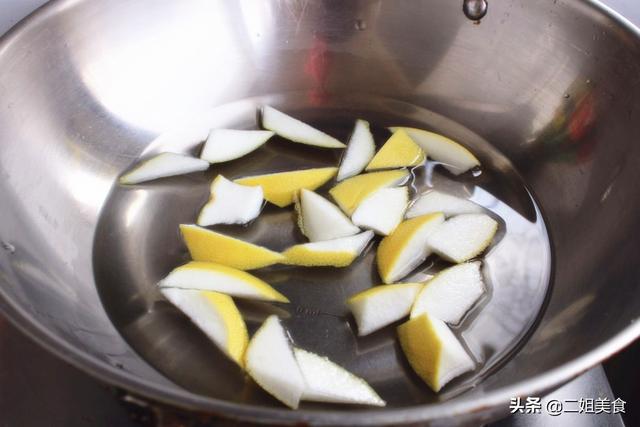必要的青涩The Indispensability of Greenness,我来为大家讲解一下关于每日背一句day131?跟着小编一起来看一看吧!

每日背一句day131
必要的青涩
The Indispensability of Greenness
今年上市的苹果种类格外地多,我独爱皮儿青青、似乎尚未熟透的那种。
The apples that come in season this year seem to have an especially big variety. What appeals to me is the kind that is green and not yet fully ripe.
此句在泛指作者历来的偏爱,不受时间限制的一种价值观。时态为一般现在时。
周末和女友逛水果店,她挑最大最红的买,生怕春色不够似的。我则逗留在顶边上的柜台,那儿不起眼地堆着我一个冬天未见的青苹果。
Last weekend my girl friend and I visited one fruit shop. She laid her hands on the biggest and the reddest, as if she had not had enough of the color of spring, whereas I lingered before the farthest counter where green apples were piled inconspicuously, which I had missed for the whole winter.
linger verb[usually adv. / prep.] · to stay somewhere for longer because you do not want to leave; to spend a long time doing sth· 流连;逗留;徘徊;花很长时间做(某事);磨蹭:She lingered for a few minutes to talk to Nick. 她多待了几分钟,想跟尼克谈一谈。
conspicuous adj. · easy to see or notice; likely to attract attention· 易见的;明显的;惹人注意的:
“春色”→无论在世界上哪个角落,春天到来意味着万物复苏、鲜花盛开、姹紫嫣红。人们都喜欢春天。:直译为the color of spring能传达原作之义。
“逗留”译作“stay”不妥,stay常作“住”解。用linger似可传达“徘徊,不忍离去”之意。
相争不下,索性各按自己的偏好买了一网兜,都很不服气的样子,暗笑对方不会享受真正的生活。
Not being able to settle the argument as to which is better, we just each bought a string bagful of the kind we respectively favored, and each was secretly laughing at the other’s inability to enjoy the real pleasures of life.
“相争不下”在译文中宜点明作者和女友争论什么。
“索性”→直截了当,干脆,我们在参考译文中用just,可以达意。例句考证:“索性都捅出来”→why not just let the whole thing out?
小时候吃苹果,我也爱挑红润的,因其意味着成熟,而熟透的水果必然甜美爽口。
In fact when I was a child I also liked bright red apples because red apples are ripe apples, and fully ripe apples are bound to taste sweet and refreshing.
“红润”如果用来指“脸色”,可以用ruddy,rosy等。此处指“苹果”,用red较好。“成熟”指“苹果”,宜用ripe。
“甜美”此处就指“甜”,译作sweet就够了。
年岁渐增,熟识了生活中诸般滋味之后,反倒偏爱上青苹果的那种清甜——带着点酸涩的甜、饱含水份的甜,咬一口有清脆的声响。
The long process of maturity has acquainted me with the different flavors of life and causes me quite unexpectedly to fall in love with the plain sweetness peculiar to green apples, which are crisp and juicy, and taste slightly sour and puckery.
此篇文章从此处逐渐转入主题,阐明“青涩”的必要性。
“The long process of maturity ”做主语,可使译文精练。
“熟识了”用现在完成时态,就说明作者已饱经风雨、心地成熟。
我们说生活中有“酸甜苦辣”可以用bitter-sweet memory,此处的“生活中诸般滋味”译作the different flavors of life。
清咖啡→plain coffee,清巧克力→plain chocolate,清水(不加任何添加剂的水)→plain water,此处的“清甜”可译作plain sweetness。
因下文即将展开论述生活的“酸涩”,“酸涩的甜”的译文宜往后移。
“包含水分”和“有清脆的响声”分别用一个“juicy”和“crisp”就够,“咬一口”可省译,意思已包含在crisp中。
也许,成熟、甜蜜乃至完美,并非生命的终极意义,更重要的倒是向这一目标趋近过程中万般况味的体验;唇齿之间的那一分青涩在不断转变着,反倒显得生动、真实。
It seems to me becoming mature and living a happy and even blissful life is not life’s ultimate goal. What is more meaningful is the undergoing of various experiences and the savoring of diverse tastes in the trudge to that destination. The harshness or bitterness on the tongue constantly renews and therefore remains forever vivid and realistic.
blissful adj. · extremely happy; showing happiness· 极乐的;幸福的:We spent seven blissful weeks away from work. 我们无忧无虑地度了三个星期的假。
trudge verb, noun. to walk slowly or with heavy steps, because you are tired or carrying sth heavy· (因疲劳或负重而)步履沉重地走,缓慢地走,费力地走:He trudged the last two miles to the town. 他步履艰难地走完最后两英里到了城里。
“成熟、甜蜜乃至完美”三个名词用顿号分开,为并列结构,是指人生的两个不同阶段。“完美”此处指“生活的完美”→ mature and living a happy and even blissful life ;“甜蜜”指“生活的甜蜜”→happy;“乃至完美”的意思指“happy”的程度,胜过happy,我们译作blissful(perfect happiness完美的幸福)
“向...目标趋近”→逐步走近目标:trudge(艰难的前进,跋涉)。因为从下文看,作者认为在成熟之前有痛苦、有欢乐、有甜、有涩……等“万般况味”,这种“趋近”必然是步步艰难。“况味”→境况和情味,参考译文各用一个动宾搭配来译。
“唇齿之间”→舌头上,对不同味道作出反应是“舌头”。
“青涩”中的“青”是颜色词,与舌头无关;“”青涩二字此处是因果关系,即“因青(年幼无知)而涩(痛苦、粗拙)”。“青”此处不译,“涩”我们此处用harshness→味道的苦涩/(生活、现实)严酷、严峻;和bitterness→味道的苦/(生活的)痛苦。译文中双关使用这两个本、喻义兼有的词也许可以传达原文的精彩之处。
“不断转变”不宜译作constantly changing,因为作者指的是人生道路不平坦,走一步有一番酸甜苦辣的体验,进一步就有一些温故而知新的感受,我们建议用renew→vi. become new again。
正如稚齿孩童可能认定糖果是世界上最好的东西,成人之后反而学会并且喜好品味茶或咖啡—其底蕴更切近于生活的本质。
Similarly, children may conclude candies are the nicest things in the world. However, arriving at adulthood, these same persons will learn to appreciate tea or coffee, which tastes, so to speak, like life itself.
此句较长,宜切分成两句译,“稚齿孩童”的爱好为一句,长大“成人”后的新爱好为另一句,中间用however连接,表示转折。
“底蕴”此处理解为“滋味”。我们根据上下文、根据作者使用的、贯穿全文的比喻,做这样理解:正如茶有涩味,咖啡有苦味,生活中也有类似品味,而成人之后才能体会、领略生活中的苦涩味。→However, arriving at adulthood, these same persons will learn to appreciate tea or coffee, which tastes, so to speak, like life itself.
重温仓促来去的日子,那成熟之前的天真幼稚印象最深:爱、被爱、错失、落叶般瑟缩的痛苦以及繁硕如花枝招展的欢乐,样样都是第一次,都曾在空白的履历上留下无可涂改的痕迹,也都具备着他物难以替代的价值。
Looking back on quickly-elapsed years, we may find that the period of innocence and naivety seems to have given us the deepest impression: loving and being loved the first time, letting the first chance slip by, unprecedentedly sorrowful feelings like fallen leaves withering fast and the first time-experienced ecstatic joys like flowers in full blossom. All these have left inerasable marks on our path of life and have demonstrated their worth of being irreplaceable.
elapse verb (not usually used in the progressive tenses 通常不用于进行时)(formal)· if a period of time elapses, it passes· (时间)消逝,流逝 Many years elapsed before they met again. 过了许多年他们才再次相见。
此句无主语,根据下文我们补充了we,同时宜按照逻辑把原句切成两句。
“仓促来去”一般指人,此处用quickly-elapsed days。elapse(vi.)常用于正式文体。
成熟之前的天真幼稚→天真幼稚阶段: the period of innocence and naivety
“爱、被爱”大概指初恋;“错失”大概指白白放走一些机会,未大胆表白爱;初次的极大痛苦和初次的极大快乐。
此处的“样样都是第一次”译时作不同译法、放不同位置。
“履历上留下无可涂改的痕迹”我们换用了英文中的比喻→ inerasable marks on our path of life :生活道路上无法磨去的痕迹。
也许我们的激情不切实际,也许我们的言谈举止尚缺乏老练沉稳,也许我们的好心常常做了错事,诸如此类,堪以月蚀的缺憾来比喻;然而混沌未开的青春毕竟是朴素真实的,它拒绝雕饰幼稚犹如苹果青涩的一面,是必然的,也是必要的。
There might have been such regrets as our enthusiasm being impractical and our conduct lacking in sophistication and sedateness. We might have even done wrong deeds through good intentions. Such phenomena are mere eclipses of the moon. However, one’s uninitiated and unsophisticated youth is simple and genuine. Just like the unripeness of the apple, youth’s innocence of embellishments is a logical necessity.
分号前是三个并列分句,很长,如译成三个排比译文会更长,应适当断句。“ such regrets as ”是由上下文移位至此处。
“月蚀的缺憾”指的就是“月蚀”,“缺憾”和“月蚀”是同位关系。→eclipse。
“混沌未开”指青少年对人世的复杂、生活的艰辛等等毫无所知。我们用了initiate(into)→(vt.)使人了解...(奥秘)的知识。Sophisticate→(vt.)使世故。以上两个词分别表示“对...尚未有知”和“(有知后的)不世故”。
“拒绝”此处指的是“人在青少年时期敏感好学,不会对“雕饰”进行“拒绝”,只是处于天真、原始暂无“雕饰”状”。我们译作 innocence of embellishments
“必然的”→指哲学规律,事物发展的逻辑必然性;“必要的”→事物的不可缺少性。用“形+名”的结构更符合习惯。
青涩是与生俱来、无法磨灭的斑驳胎记,我们大可不必为自己幼稚粗拙的一面过分地脸红。在红尘滚滚中做一只早熟的果实也是遗憾的,因为它会失去许多生命的体验。悬挂的青苹果,让原始的诗意永远在枝头悬挂着吧。
The greenness of youth, like an indelible birthmark, is nothing to be overly ashamed of. On the other hand, it is also a matter of great regret for a person to be “early-ripe” in this very complicated and sophisticated world, because that would have cost him many opportunities of experiencing life. Green apples overhead, may your original poeticalness abide with you forever!
“与生俱来”不必译,“胎记”就是与生俱来的。
“斑驳”指“一种颜色中杂有别种颜色”,胎记一般为单色,“斑驳”不译为好,容易产生“只有杂色的胎记才是如此情况”的误解。
“幼稚粗拙的一面”是对上一句中“苹果青涩的一面”的注释,“一面”不译为好,因为“青涩(幼稚粗拙)”并不与“甜美”同时存在。
“红尘”我们紧扣上文(作者喜欢、榴莲年轻时的朴素真实),把“滚滚红尘”译作this very complicated and sophisticated world。
“失去许多生命的体验”→失去了体验生命的许多机会。
“原始的诗意”前加your,使其与主语连贯。
“悬挂着吧”用 abide with you ,abide是比较古风的说法,意思是remain和dwell。
重点表达
今年上市的 come in season this year
种类格外地多 have an especially big variety
我独爱……What appeals to me is ...
尚未熟透not yet fully ripe
春色the color of spring
享受真正的生活enjoy the real pleasures of life
甜美爽口taste sweet and refreshing
生活中诸般滋味the different flavors of life
清甜plain sweetness
生命的终极意义 life’s ultimate goal
唇齿之间的那一分青涩the harshness or bitterness on the tongue
更切近于生活的本质tastes like life itself
仓促来去的日子quickly-elapsed years
缺乏老练沉稳lacking in sophistication and sedateness
月蚀的缺憾eclipses of the moon
,




